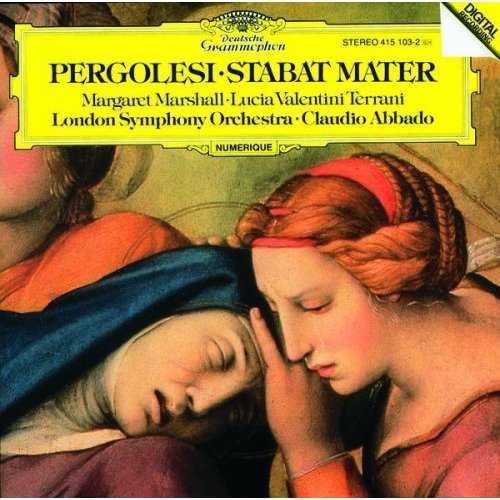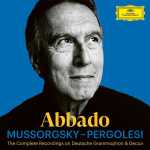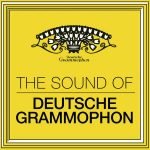
Composer: Giovanni Pergolesi
Performer: Lucia Valentini Terrani, Leslie Pearson, Margaret Marshall
Orchestra: London Symphony Orchestra
Conductor: Claudio Abbado
Audio CD
SPARS Code: DDD
Number of Discs: 1
Format: FLAC (tracks+cue)
Label: Deutsche Grammophon
Size: 208 MB
Recovery: +3%
Scan: yes
01. Stabat Mater – 1. Stabat Mater
02. Stabat Mater – 2. Cujus animam
03. Stabat Mater – 3. O quam tristis
04. Stabat Mater – 4. Quae moerabat
05. Stabat Mater – 5. Quis est homo
06. Stabat Mater – 6. Vidit suum
07. Stabat Mater – 7. Eia Mater
08. Stabat Mater – 8. Fac ut ardeat
09. Stabat Mater – 9. Sancta Mater
10. Stabat Mater – 10. Fac ut portem
11. Stabat Mater – 11. Inflammatus
12. Stabat Mater – 12. Quando corpus – Amen
Beautiful and devotional in its Romantic way
I have read such a lot of tendentious rubbish about various recordings of this simplest, most celebrated and sublime masterpiece that I thought it might be enlightening to attempt a comparison across three disparate versions of it, each representing one, particular, entrenched interpretative camp. That’s difficult; there are so many to choose from and so many have merit, as this music can survive a whole range of approaches, but I plumped for these three: Alessandri on the Naive label (cutting edge HIP; slimmer voices); Abbado (old-fashioned, traditional, big-sound; singers operatic with vibrato); and Rousset (compromise: original instruments but more relaxed tempi and somewhat more operatic voices). I am amused at some of the more condescending pronouncements made de haut en bas by the “period Nazis”; we really do not always know a) how the music sounded when it was first played; b) what the composer actually wanted; c) what he would have liked – which is not necessarily the same thing as point “b”! In the end we must forget dogma and say what moves us today.
The results of my comparison are necessarily subjective and skewed to my ears and taste, but I thought they might be of interest to anyone picking their way through the plethora of choices available.
All enjoy beautiful sound and I don’t propose to waste much time on that. Regarding tempi, the Alessandri goes to extremes, sometimes breathlessly fast (“Quae moerebat”) and sometimes lugubriously clumsy and plonking (opening movement “Stabat mater”) with heavy accents on the first beat of every bar. The Abbado is Romantically leisurely and inclined to lack contrast, but the suspended harmonies of that famous opening have a stately grandeur which instantly transports the listener into a spiritual realm. Rousset is inclined to rush but represents a juste milieu between the other two and his “period accents” are more discreet than those of Alessandri. Orchestral accompaniment: obviously Abbado has a big band but it does not by any means overwhelm his singers. Alessandri has a small, period band with its usual concomitant characteristics: lean, slightly vinegary string tone and great clarity. Rousset’s original instruments seems to me to strike the right balance between amplitude and delicacy, being both sweeter and more yielding than those of Alessandri but obviously not as thick of texture as Abbado’s LSO.
Finally, the singers: all three versions are decidedly well sung. Gemma Bertagnolli is neither as famous nor as lustrous-voiced as all the other singers concerned and it shows a little in the ordinariness of her vocal quality; both Margaret Marshall and Barbara Bonney are superior in bell-like clarity and limpid beauty of tone. I disagree with the complaints of some previous reviewers: neither of these latter two has so slow a vibrato that either intonation or harmonisation with the alto is obscured, and they do make concessions to the period. Mingardo has a lovely voice and copes remarkably well with the absurdly rushed tempo in the aforementioned “Quae moerebat”, but that speed is wholly inappropriate to the emotion expressed by the text and I am a sucker for Scholl’s and Valenti-Terrani’s resonant, oboe-tones, especially as their conductors permit them more apt tempi. Scholl and Bonney also occasionally introduce some discreet ornamentation and lovely trills.
If you want a strictly authentic performance and also want the Vivaldi “Stabat mater” (surely no more than a workaday filler compared with Pergolesi’s supreme work), you must go for the Alessandri; otherwise I prefer even the rather stolid Abbado purely for the quality of the singing and its sincerity of utterance and I wouldn’t part with this disc, as it was the one which first introduced me to this music. The best of the three, however, remains the much-lauded Rousset/Scholl/Bonney version.




Gracias!
Many Thanks !